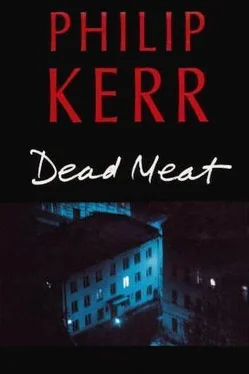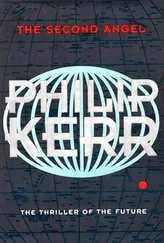He spoke with a stiff formality as if he were trying to distance himself emotionally from what had happened. The widow nodded stiffly and found a handkerchief in the sleeve of her blue acrylic sweater.
‘Yes, of course,’ she said, wiping her eyes roughly and then blowing her nose. A cigarette seemed to help her to get a grip of herself. She snatched a couple of quick drags and nodded that she was ready.
‘When did you last see your husband?’
‘It must have been around seven o’clock last night,’ she said unsteadily. ‘He went out somewhere, to see a contact he said, for some article he was preparing.’
Grushko thought of several questions at once.
‘Did he say who this contact was? Where they were meeting? When he would be back?’
‘No,’ she said and turned away to tap her ash into the bottom half of a matrushka doll. ‘Mikhail never discussed his work with me. He said that it was better that way — so that I wouldn’t worry about him. Usually I had to read Ogonyok or watch television to find out what he had been up to. Well, I dare say you’re both familiar with Mikhail’s work. He was always sticking his nose in where it wasn’t wanted. He used to say that if the Soviet Union was a can of worms then he was the can-opener. The only trouble was—’ She paused and Grushko finished what she had been going to say.
‘—He left a lot of sharp edges.’ Grushko shrugged. ‘Yes, I see.’ He paused for a moment. ‘Well, I suppose the country’s first investigative journalist was bound to make a few enemies.’
Nina Milyukin uttered a bitter, smoky laugh.
‘A few?’ she said with derision. ‘I think you’d better take a look for yourself.’
She went to the wardrobe door and drew the door open. Reaching inside she switched on a light to reveal a tiny office. A bare bulb hung from the top of the wardrobe over a small square desk and a battered old typewriter.
‘As you can see, we have a very small apartment,’ she explained and started to select some box-files from a large recessed set of shelves. ‘The sacrifice you make for living in a place with a bit of character. This was Mikhail’s office.’
I was trying to see how the wardrobe seemed larger inside than outside when suddenly I understood the ingenuity of the arrangement. Lacking a back panel the wardrobe had been placed in front of a built-in cupboard that contained the dead man’s extensive library. When Nina Milyukin stepped out of the makeshift study bearing several of the box-files I went inside and looked about more carefully.
Some of the books had only recently been made available. Quite a few would have been almost impossible to get hold of at any price. Books printed in English and German occupied a whole shelf of their own. It was the kind of library I had always dreamed of having myself.
On the desk was a Filofax that I opened and looked up the previous day’s date, but no entry had been made. I turned a few pages forward. The handwriting was long and girlish. It seemed hardly suitable for a great journalist. Above the desk was a felt-covered pinboard, and on it were some postcards of London and the Pyramids, a membership card of the Felis Cat-Lover’s Club and, in pride of place, a photograph of a smiling Milyukin shaking hands with Margaret Thatcher. But it was not this that interested me so much as the photographs of Nina Milyukin, for in one of them she was naked. It had been taken in some other apartment, in a pose more provocative than artistic: wearing only a pair of stockings she stood facing the camera, her hands clasped behind her back, her head lowered almost penitently, as if she had done something of which she was slightly ashamed.
Perhaps the taking of the picture itself had been sufficient embarrassment.
‘These letters were forwarded by Krokodil and Ogonyok,’ she was explaining to Grushko. ‘They’re mostly all like that one. Hate mail is the only kind of letter that never gets lost by the Post Office. He tried to keep those hidden from me, but there’s not much a man can keep hidden from his wife in an apartment this size.’
When I stepped out of the wardrobe, bringing the Filofax with me, Grushko handed me the letter he had been reading and shook his head despairingly.
‘Comrade Milyukin,’ it read. ‘Your article in Krokodil on the Leningrad black market made us all laugh so much. Your suggestion, that it is only when people are able to resist this kind of consumerism that the country will be able to rebuild itself, is absurd. Why should they when there’s nothing in the shops but empty shelves and excuses. It’s bastards like you who try and spoil it for everyone. I hope that one of the prostitutes you are always writing about — no doubt from your own personal experience — gives you AIDS. I hope you pass it on to your wife and that she passes it on to the man she is probably screwing. Yours, a well-wisher.’
The thought of her screwing another man reminded me of the photograph in the wardrobe and I was tempted to go and take another look at it.
‘Are they all like this?’ I asked.
‘There are plenty worse than that,’ she said, extinguishing her cigarette and lighting another.
‘When we still discussed his work, Mikhail used to quote a poem by Pasternak, about how poetry is murderous. “If I had known that this is what happens, when I at first stood up and read; that poetry is murderous, will strangle you and leave you dead I would—”’
Grushko interrupted her, completing the quotation. ‘“I would have decided not to play games with reality,”’ he said.
At first I was impressed that Grushko had been able to quote Pasternak with such ease; and then I found myself wondering about the pregnant pause he had brought to the line of poetry. I asked myself if he might have intended some criticism of Nina Milyukin, or indeed of Milyukin himself?
‘Mikhail said that the same had become true of journalism.’ She spoke with uncertainty, as if she too had detected some sarcasm.
‘Yes,’ said Grushko, looking over another of the letters, ‘I heard him say that.’
‘You knew my husband?’
‘Oh, yes.’
‘He never mentioned you, Colonel Grushko.’
‘No, well, I dare say he had no wish to worry you. Mikhail Mikhailovich put a number of cases our way. Cases which involved the Mafia. You can be proud of him. He was a fine man.’
Nina Milyukin blinked sadly and nodded without enthusiasm, as if not much encouraged by what Grushko had said. She coloured visibly.
‘He was a fine man,’ she repeated. ‘A real hero.’
It was evident that she was on the edge of saying something that she might have come to regret.
‘These threats,’ said Grushko. ‘Were there any he took especially seriously?’
‘He took them all seriously. You understand, I’m guessing — he tried to avoid talking about this sort of thing—’
‘So as not to worry you, yes, you said—’
‘But in the last few months, I think some of it really got to him. He started to have nightmares. And he was drinking quite heavily.’
Grushko frowned and shook his head.
‘And he never explained what was troubling him? He never once tried to share his worries? I find that hard to believe. Oh, I’m not suggesting you’re lying or anything, Mrs Milyukin. No, I’m just puzzled as to your relationship with him. You’ll forgive me for asking — I’m afraid I have to ask these questions sometimes — but how were things between the two of you?’
Nina Milyukin reached for the handkerchief again.
‘We were quite happy, thank you,’ she said. ‘There were no problems. At least no problems that anyone else—’
‘Those are the sort of problems I’m talking about,’ Grushko persisted. ‘The usual ones.’
Читать дальше












